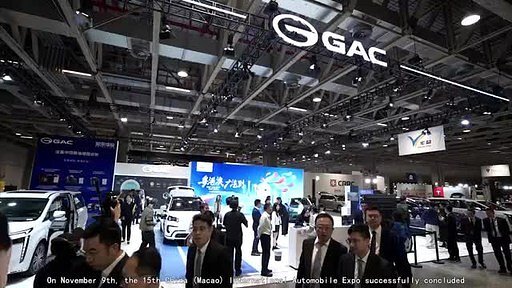
GAC Aion Drives into Macau with New Global Launch, Eyes Expanding EV Market
Chinese automaker GAC Aion launched its new compact EV, the Aion UT, in Macau, signaling a strategic push into international markets and a growing commitment to electric vehicle innovation. The move comes amid rising EV adoption in the region.
GAC Aion Drives into Macau with New Global Launch, Eyes Expanding EV Market
Macau, November 12, 2025 – Chinese automaker GAC Aion officially launched its new compact electric vehicle, the Aion UT, in Macau today, marking the vehicle’s global debut and signaling a strategic expansion into international markets. The launch comes at a pivotal moment as Macau actively promotes electric vehicle adoption through government incentives and infrastructure development.
Presented at the 15th China (Macau) International Automobile Expo, the Aion UT is positioned as a key component of GAC Aion's international growth strategy. The company views Macau as a strategic testing ground, capitalizing on the region's compact size, forward-looking government policies, and growing consumer interest in EVs.
Macau’s EV Landscape: A Growing Opportunity
Macau’s push towards electric mobility is underpinned by a series of government incentives, including tax exemptions and the development of a comprehensive charging infrastructure. The government extended tax incentives for NEVs until the end of 2025, exempting Battery Electric Vehicles (BEVs) from vehicle tax and offering a 30% reduction for Hybrid Electric Vehicles (HEVs). As of late 2023, Macau boasted over 500 public charging points, with plans to expand coverage to all public car parks by 2025.
“The government is actively encouraging a shift towards sustainable transportation,” explains a source within the Macau Environmental Protection Bureau. “We believe EVs are crucial for reducing emissions and improving air quality in our densely populated region.”
This supportive environment has attracted attention from various automakers, including Tesla and Volkswagen, creating a competitive, yet promising landscape for EV adoption. However, the market remains relatively small, offering both opportunities and challenges for new entrants.
Aion UT: Specifications and Market Positioning
The Aion UT is designed as a compact electric vehicle, prioritizing urban practicality and modern design. GAC Aion emphasizes its “fashionable and intelligent” aesthetic, aiming to appeal to a younger, tech-savvy demographic. Key features include Level 2 Advanced Driver-Assistance Systems (ADAS), offering enhanced safety and convenience features like adaptive cruise control and lane-keeping assist, and a reportedly spacious interior.
While detailed specifications, such as battery capacity and range, remain under wraps, GAC Aion positions the UT as a versatile vehicle suitable for daily commutes and weekend excursions. The “UT” designation hints at its focus on utility and adaptability within urban environments.
“The Aion UT is more than just a vehicle; it’s a statement about our commitment to innovation and sustainability,” said a GAC Aion spokesperson during the launch event. “We believe it will resonate with consumers who are looking for a stylish, efficient, and environmentally friendly transportation solution.”
GAC Aion’s Global Ambitions
The Macau launch is a key step in GAC Aion’s broader international expansion strategy. Despite a challenging year for the automotive industry, GAC Aion has maintained a strong focus on electric vehicle development and export markets. In 2024, the company exported 127,000 vehicles to 74 countries, representing a 67.6% year-on-year increase. The company aims for 150,000 overseas sales in 2025 and a long-term target of 500,000 units.
However, GAC Aion isn't alone in its pursuit of international expansion. Competition from established automakers like Tesla and emerging Chinese EV brands like BYD and Nio is intensifying. BYD, in particular, is rapidly expanding its global footprint, leveraging its competitive pricing and diverse range of electric vehicles.
“The global EV market is becoming increasingly crowded,” notes an industry analyst. “GAC Aion needs to differentiate itself through innovative technology, compelling design, and a strong after-sales service network to succeed.”
Navigating Competition and Building Trust
Beyond competition, GAC Aion faces the challenge of building brand recognition and trust in overseas markets. Chinese automakers have historically struggled to establish a strong presence outside of China, often facing concerns about quality and reliability.
“Building trust is paramount,” explains a marketing consultant specializing in the automotive industry. “GAC Aion needs to demonstrate its commitment to quality, safety, and customer satisfaction to overcome these perceptions.”
To address these challenges, GAC Aion is focusing on building partnerships with local distributors and establishing a robust after-sales service network. The company is also investing in research and development to enhance its vehicle technology and address the specific needs of different markets.
The Road Ahead
The launch of the Aion UT in Macau marks an important milestone for GAC Aion and signifies a growing commitment to electric vehicle innovation and international expansion. While challenges remain, the company is well-positioned to capitalize on the growing demand for EVs and establish itself as a leading player in the global automotive market. The company’s choice of Macau as a testing ground, combined with government support and a growing EV infrastructure, creates a favorable environment for success. However, the company’s long-term success will depend on its ability to navigate competition, build brand trust, and deliver high-quality, innovative vehicles that meet the evolving needs of consumers.
